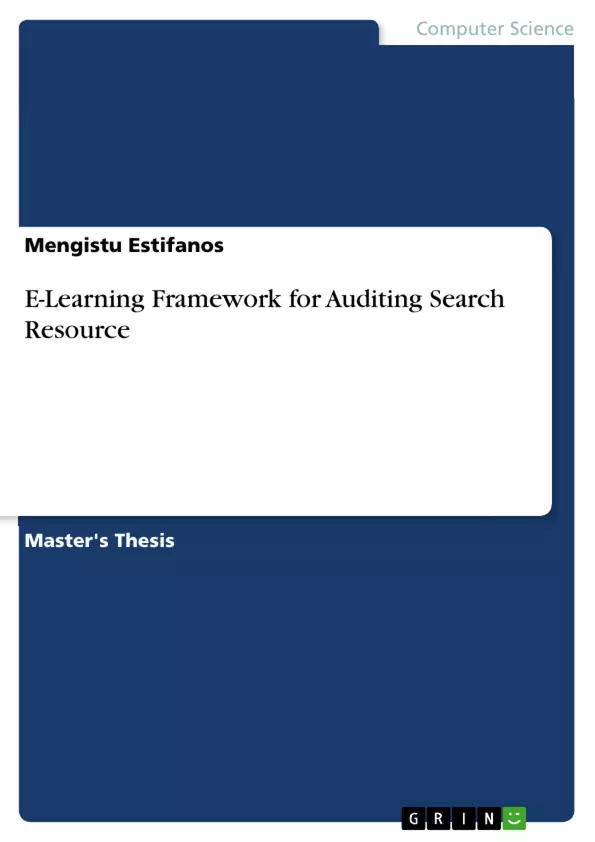Nowadays, E-learning is dynamically changing the phase of educational system. It has played a big role in providing academic resources to distance and continuing educational systems that helped the students and Instructor in coping with the demand of the fast-driven learning setup. Because of its importance, the demand to enhance its capabilities in the searching and presentation of its learning resources is now the focus of some researches.
In this paper, the researcher presents a new framework for an E-learning system with enhanced searching capabilities. The proposed framework is mainly focused on the improvements of the search capability to obtain more refined search results including the functionalities to be able to handle failed searches. The main contribution of this research study is to present a new and efficient e-learning framework that will be used as a model for the development of an e-learning system, integrated with search auditing functionality.
Inhaltsverzeichnis (Table of Contents)
- CHAPTER ONE
- INTRODUCTION
- Backgrounds of the study
- Statement of the problem
- Research Question
- Objective of the study
- General objective
- Specific objectives
- Scope and limitation of the study
- Significance of the Research
- Thesis Layout
- CHAPTER TWO
- Research Design and Methodology
- Research Methodology
- Literature review
- Direct observation
- Interview
- Building the Framework
- Research Strategy
- Methods of Data Collection
- Questionnaire
- Source of Data
- Teachers
- E-learning administrators
- Data Collection Procedure
- Population, sample size and sampling technique
- Research Instruments
- Data Analysis procedure
- CHAPTER THREE
- Literature Review and Related Studies
- Overview of E-learning system
- Definition of E-learning
- Evolution of E-learning
- Types of E-learning
- Advantage and disadvantage of E-learning
- Advantages of E-learning
- Disadvantage of E-learning
- Current status of E-learning
- Challenges of E-learning
- Opportunities of E-learning
- Trends in E-learning
- Related review
- CHAPTER FOUR
- Building the Framework
- Designing the Learning Management System
- Proposed E-learning framework
- Pre-learning Process
- Learning Process
- Post-Learning Process
- Contribution to the new e-learning framework
- Frequently Searched Learning Resource (FSLR)
- Pending Search (PS)
- CHAPTER FIVE
- Evaluating the Framework
- Selection of Evaluation Instrument
- ISO 9126 model
- Literatures for e-learning evaluation
- Proposed Evaluation Instrument
- CHAPTER SIX
- Results and Discussion
- Functionality
- Reliability
- Usability
- Efficiency
Zielsetzung und Themenschwerpunkte (Objectives and Key Themes)
This thesis aims to develop an e-learning framework for auditing search resources to enhance the efficiency and effectiveness of learning in a university setting. The framework focuses on creating a system that integrates learning resources, facilitates online collaboration, and allows students to access and utilize educational materials effectively.
- E-learning framework design
- Integration of learning resources
- Online collaboration and communication
- Effective access and utilization of educational materials
- Evaluation of the proposed framework
Zusammenfassung der Kapitel (Chapter Summaries)
Chapter One provides a detailed introduction to the research, including the background, problem statement, research questions, objectives, scope, significance, and thesis layout. Chapter Two outlines the research design and methodology employed in the study, focusing on literature review, data collection methods, and data analysis techniques. Chapter Three presents a comprehensive literature review on e-learning systems, exploring definitions, evolution, types, advantages, disadvantages, current status, challenges, opportunities, and trends in e-learning.
Chapter Four delves into the process of building the e-learning framework, detailing the design of the Learning Management System (LMS) and the proposed framework itself. This chapter also discusses the contributions of the new framework, such as the inclusion of Frequently Searched Learning Resources (FSLR) and Pending Search (PS) functionalities. Chapter Five focuses on evaluating the framework, exploring the selection of evaluation instruments, including the ISO 9126 model, and examining relevant literature on e-learning evaluation.
Schlüsselwörter (Keywords)
The central focus of this thesis is on e-learning, educational resources, framework design, online learning environments, and evaluation methodologies. The study explores the development and assessment of a comprehensive e-learning framework that addresses the specific needs and challenges of auditing search resource utilization in higher education. The research utilizes various data collection techniques, including literature review, direct observation, interviews, and questionnaires, to inform the design and evaluation of the proposed framework.
Frequently Asked Questions
What is an E-learning Framework for Auditing?
It is a structural model designed to enhance search capabilities and track the utilization of educational resources within an online learning system.
What are "Pending Searches" in this framework?
It is a functionality that handles failed searches, allowing administrators to identify missing resources and fulfill student needs later.
Which model is used for evaluating the E-learning system?
The research utilizes the ISO 9126 model, which focuses on quality attributes like functionality, reliability, usability, and efficiency.
Why is search auditing important for distance learning?
It helps instructors understand what academic resources are most in demand and ensures that students can find the materials they need effectively.
What is "FSLR" in the proposed framework?
FSLR stands for Frequently Searched Learning Resources, a feature that highlights the most popular materials for easier access.
- Arbeit zitieren
- Mengistu Estifanos (Autor:in), 2017, E-Learning Framework for Auditing Search Resource, München, GRIN Verlag, https://www.grin.com/document/494200



